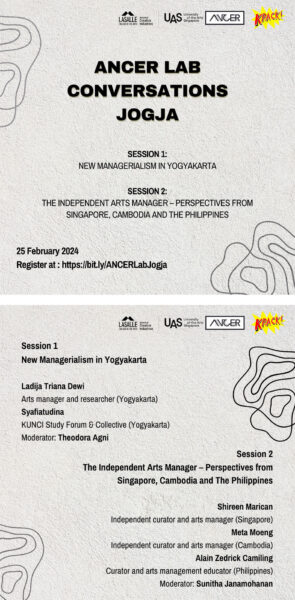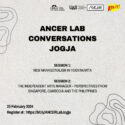Yogyakarta
24 – 27 February 2024
 The ANCER Lab Yogyakarta focuses on questions of what “management” means in Yogyakarta and other cities in Southeast Asia as arts workers evolve their practice in response to a changing arts landscape shaped by the rise of the global creative economy and the demands and expectations of governments, funders, and audiences. The ANCER Lab comprises a day-long symposium, the ANCER Lab Conversation | Percakapan ANCER Lab, and visits to selected arts spaces to meet local practitioners.
The ANCER Lab Yogyakarta focuses on questions of what “management” means in Yogyakarta and other cities in Southeast Asia as arts workers evolve their practice in response to a changing arts landscape shaped by the rise of the global creative economy and the demands and expectations of governments, funders, and audiences. The ANCER Lab comprises a day-long symposium, the ANCER Lab Conversation | Percakapan ANCER Lab, and visits to selected arts spaces to meet local practitioners.
Background
The history of contemporary art in Yogyakarta from the 1990s to the early 2000s has been characterised by several artistic developments that have influenced the practice of managing arts and shaped the local arts ecosystem. A period that saw the establishment of artists’ collectives, arts organisations and alternative spaces which have played a crucial role in promoting experimental works, organising exhibitions, nurturing artistic talent and encouraging artistic dialogue, some notable initiatives include Cemeti Art House (1988), Kedai Kebun Forum (1996), Cemeti Art Foundation/Indonesian Visual Art Archive (1995), and Taring Padi (1998). At the same time, issues related to identity, politics and social change became increasingly important in contemporary arts practice. Artworks with sociopolitical themes have formed the identity of Indonesian contemporary arts.
The 1990s marked the beginning of a new era of managerialism in the arts, which can be characterised by the use of narrative reports as the benchmark for assessing and evaluating arts projects. The term “new managerialism” was coined by St. Sunardi (2016), characterised by the excessive use of qualitative and quantitative measures, and an emphasis on the principles of auditing, which departs from the ideology of the free market and contradicts the ideals of the education reform movement in Indonesia.
ANCER Lab Conversation | Percakapan ANCER Lab
Taking Sunardi’s concept of new managerialism as a departure point, the ANCER Lab Conversation focuses on the definition of “managerialism” today in the context of ensuring the long-term viability of artistic practices while safeguarding artistic freedom in Yogyakarta. What strategies are required to make contemporary arts management a driving force for the further and sustainable development of arts and culture in our respective current sociopolitical settings? While there has been much attention paid to contemporary artists in Yogyakarta, what about arts managers and their roles? What characterises the “management” of the arts today in this context, what are the constraints and the possibilities?
ANCER Lab Conversation Programme Schedule
ANCER Lab Conversation Speakers’ Bios
Register at https://bit.ly/ANCERLabJogja
Email enquiries to coordinator@ancernetwork.org


